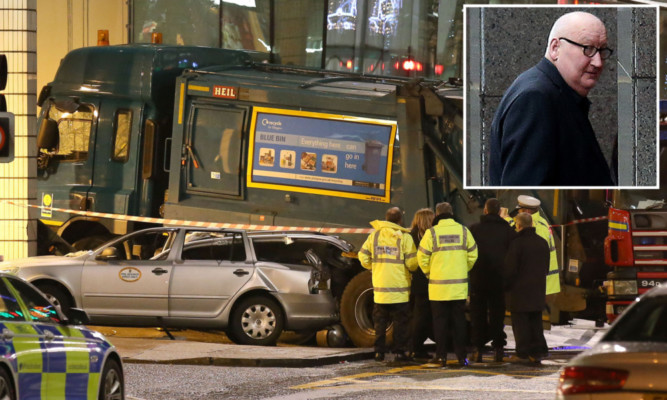The driver of a bin lorry which crashed in Glasgow killing six people repeatedly lied about his medical history, a sheriff has found.
Harry Clarke had lost consciousness when the truck careered along a busy street in the city centre on December 22 last year.
A fatal accident inquiry (FAI) found the accident might have been avoided if Mr Clarke had told the truth about his medical history after it emerged he had previously blacked out while at the wheel of a stationary bus.
Sheriff John Beckett QC found the 58-year-old had “repeatedly lied in order to gain and retain jobs and licences”, and “deliberately concealed relevant information from the DVLA”.
He found eight “reasonable precautions” – all relating to Mr Clarke’s medical past – whereby the accident might have been avoided and has made recommendations which could reduce the chance of another such tragedy from happening.
Sheriff Beckett made a total of 19 recommendations, including calling on Transport Secretary Patrick McLoughlin to hold a consultation on whether doctors should be given more freedom to report fitness-to-drive concerns directly to the DVLA.
In a written determination, Sheriff Beckett said: “The most effective measure to prevent such an occurrence would be to seek to avoid drivers becoming incapacitated at the wheel.
“Responsibility in that regard lies with drivers themselves and Driver and Vehicle Licensing Agency (DVLA).
“It may well be that the single most useful outcome of this inquiry would be to raise awareness of the dangers involved in driving if subject to a medical condition which could cause the driver to lose control of a vehicle.”
Erin McQuade, 18, and her grandparents Jack Sweeney, 68, and Lorraine Sweeney, 69, from Dumbarton; Stephenie Tait, 29, and Jacqueline Morton, 51, both from Glasgow; and Gillian Ewing, 52, from Edinburgh, lost their lives in the crash.
David Wilson, of Digby Brown Solicitors, which represents the bereaved Morton family, said: “The determination confirms so much of what the Morton family and others have known for some time. This was an avoidable tragedy.
“Harry Clarke is not an evil person but he did a series of bad things which led to a tragedy. It’s really important to the families that this type of accident does not happen again.”
The Crown Office has been criticised for failing to bring charges against Mr Clarke.
It said in a statement: “The Crown has repeatedly made it clear there was insufficient evidence in criminal law to prosecute the driver for the tragic deaths which resulted from this accident or for the wider circumstances including the information the driver provided to the DVLA or his employer.
“There are no findings in the determination that undermine the decisions not to prosecute the driver.”
A further 15 people were injured when the Glasgow City Council truck veered out of control.
It had travelled along the pavement in Queen Street before crashing into the side of the Millennium Hotel in George Square.
The inquiry heard evidence over five weeks at the city’s Sheriff Court in July and August this year.
The probe heard that it took just 19 seconds for the tragedy to unfold.
During the course of the incident, numerous members of the public saw Mr Clarke unconscious, slumped forward in the driver’s seat.
The inquiry also heard he had a history of health issues dating back to the 1970s – including a previous blackout in 2010 when at the wheel of a stationary bus – but had not disclosed his medical background to his employers or the DVLA.
Sheriff Beckett found: “Mr Clarke deceived all three doctors in the hope that he would be able to return to work sooner rather than later so that he would not lose his job.”
When he gave evidence towards the end of the hearing, Mr Clarke was warned by the sheriff he did not have to answer questions which could incriminate him as the families of some of the victims had signalled their intention to raise a private prosecution against him.
It is understood that papers could be lodged with the Lord Advocate before Christmas.
Mr Clarke was later suspended from his council job and resigned before he was due to face a disciplinary hearing.
He told a BBC documentary that he “unreservedly” apologises for his role in the tragedy.
In a letter to the broadcaster, he said: “I understand that the impact of this event on me is irrelevant when compared to the loss that the families of the victims have suffered.
“I wish to unreservedly apologise for my role in this tragic event.”
A special service will be held to mark the anniversary of the crash and will take place at Glasgow Cathedral on December 22.
